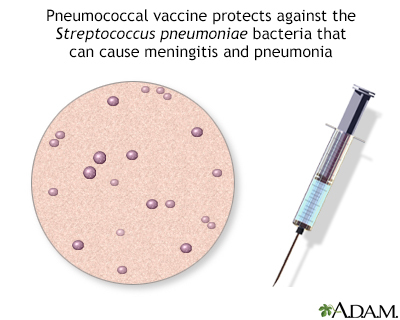Pneumococcal polysaccharide vaccine (PPSV23) - what you need to know
Definition
All content below is taken in its entirety from the CDC Pneumococcal Polysaccharide Vaccine Information Statement (VIS): www.cdc.gov/vaccines/hcp/vis/vis-statements/ppv.html
CDC review information for Pneumococcal Polysaccharide VIS:
- Page last reviewed: October 30, 2019
- Page last updated: October 31, 2019
- Issue date of VIS: October 30, 2019
Content source: National Center for Immunization and Respiratory Diseases
Information
Why get vaccinated?
Pneumococcal polysaccharide vaccine (PPSV23) can prevent pneumococcal disease.
Pneumococcal disease refers to any illness caused by pneumococcal bacteria. These bacteria can cause many types of illnesses, including pneumonia, which is an infection of the lungs. Pneumococcal bacteria are one of the most common causes of pneumonia.
Besides pneumonia, pneumococcal bacteria can also cause:
- Ear infections
- Sinus infections
- Meningitis (infection of the tissue covering the brain and spinal cord)
- Bacteremia (bloodstream infection)
Anyone can get pneumococcal disease, but children under 2 years of age, people with certain medical conditions, adults 65 years or older, and cigarette smokers are at the highest risk.
Most pneumococcal infections are mild. However, some can result in long-term problems, such as brain damage or hearing loss. Meningitis, bacteremia, and pneumonia caused by pneumococcal disease can be fatal.
PPSV23
PPSV23 protects against 23 types of bacteria that cause pneumococcal disease.
PPSV23 is recommended for:
- All adults 65 years or older.
- Anyone 2 years or older with certain medical conditions that can lead to an increased risk for pneumococcal disease.
Most people need only one dose of PPSV23. A second dose of PPSV23, and another type of pneumococcal vaccine called PCV13, are recommended for certain high-risk groups. Your health care provider can give you more information.
People 65 years or older should get a dose of PPSV23 even if they have already gotten one or more doses of the vaccine before they turned 65.
Talk with your health care provider
Tell your vaccine provider if the person getting the vaccine has had an allergic reaction after a previous dose of PPSV23, or has any severe, life-threatening allergies.
In some cases, your provider may decide to postpone PPSV23 vaccination to a future visit.
People with minor illnesses, such as a cold, may be vaccinated. People who are moderately or severely ill should usually wait until they recover before getting PPSV23.
Your provider can give you more information.
Risks of a vaccine reaction
Redness or pain where the shot is given, feeling tired, fever, or muscle aches can happen after PPSV23.
People sometimes faint after medical procedures, including vaccination. Tell your provider if you feel dizzy or have vision changes or ringing in the ears.
As with any medicine, there is a very remote chance of a vaccine causing a severe allergic reaction, other serious injury, or death.
What if there is a serious problem?
An allergic reaction could occur after the vaccinated person leaves the clinic. If you see signs of a severe allergic reaction (hives, swelling of the face and throat, difficulty breathing, a fast heartbeat, dizziness, or weakness), call 911 and get the person to the nearest hospital.
For other signs that concern you, call your provider.
Adverse reactions should be reported to the Vaccine Adverse Event Reporting System (VAERS). Your health care provider will usually file this report, or you can do it yourself. Visit the VAERS website (vaers.hhs.gov) or call 1-800-822-7967. VAERS is only for reporting reactions, and VAERS staff do not give medical advice.
How can I learn more?
- Ask your provider.
- Call your local or state health department.
- Contact the Centers for Disease Control and Prevention (CDC) by calling 1-800-232-4636 (1-800-CDC-INFO) or visiting CDC's vaccine website.
Gallery


References
Centers for Disease Control and Prevention website. Pneumococcal polysaccharide vaccine (PPSV23). www.cdc.gov/vaccines/hcp/vis/vis-statements/ppv.html. Updated October 30, 2019. Accessed November 17, 2022.